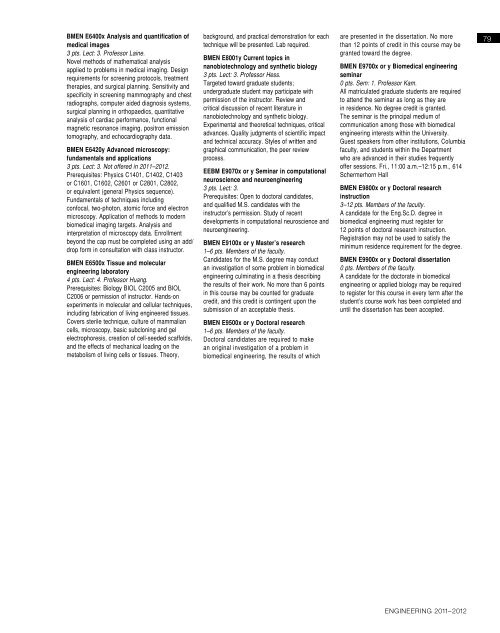2011-2012 Bulletin â PDF - SEAS Bulletin - Columbia University
2011-2012 Bulletin â PDF - SEAS Bulletin - Columbia University
2011-2012 Bulletin â PDF - SEAS Bulletin - Columbia University
You also want an ePaper? Increase the reach of your titles
YUMPU automatically turns print PDFs into web optimized ePapers that Google loves.
BMEN E6400x Analysis and quantification of<br />
medical images<br />
3 pts. Lect: 3. Professor Laine.<br />
Novel methods of mathematical analysis<br />
applied to problems in medical imaging. Design<br />
requirements for screening protocols, treatment<br />
therapies, and surgical planning. Sensitivity and<br />
specificity in screening mammography and chest<br />
radiographs, computer aided diagnosis systems,<br />
surgical planning in orthopaedics, quantitative<br />
analysis of cardiac performance, functional<br />
magnetic resonance imaging, positron emission<br />
tomography, and echocardiography data.<br />
BMEN E6420y Advanced microscopy:<br />
fundamentals and applications<br />
3 pts. Lect: 3. Not offered in <strong>2011</strong>–<strong>2012</strong>.<br />
Prerequisites: Physics C1401, C1402, C1403<br />
or C1601, C1602, C2601 or C2801, C2802,<br />
or equivalent (general Physics sequence).<br />
Fundamentals of techniques including<br />
confocal, two-photon, atomic force and electron<br />
microscopy. Application of methods to modern<br />
biomedical imaging targets. Analysis and<br />
interpretation of microscopy data. Enrollment<br />
beyond the cap must be completed using an add/<br />
drop form in consultation with class instructor.<br />
BMEN E6500x Tissue and molecular<br />
engineering laboratory<br />
4 pts. Lect: 4. Professor Huang.<br />
Prerequisites: Biology BIOL C2005 and BIOL<br />
C2006 or permission of instructor. Hands-on<br />
experiments in molecular and cellular techniques,<br />
including fabrication of living engineered tissues.<br />
Covers sterile technique, culture of mammalian<br />
cells, microscopy, basic subcloning and gel<br />
electrophoresis, creation of cell-seeded scaffolds,<br />
and the effects of mechanical loading on the<br />
metabolism of living cells or tissues. Theory,<br />
background, and practical demonstration for each<br />
technique will be presented. Lab required.<br />
BMEN E8001y Current topics in<br />
nanobiotechnology and synthetic biology<br />
3 pts. Lect: 3. Professor Hess.<br />
Targeted toward graduate students;<br />
undergraduate student may participate with<br />
permission of the instructor. Review and<br />
critical discussion of recent literature in<br />
nanobiotechnology and synthetic biology.<br />
Experimental and theoretical techniques, critical<br />
advances. Quality judgments of scientific impact<br />
and technical accuracy. Styles of written and<br />
graphical communication, the peer review<br />
process.<br />
EEBM E9070x or y Seminar in computational<br />
neuroscience and neuroengineering<br />
3 pts. Lect: 3.<br />
Prerequisites: Open to doctoral candidates,<br />
and qualified M.S. candidates with the<br />
instructor’s permission. Study of recent<br />
developments in computational neuroscience and<br />
neuroengineering.<br />
BMEN E9100x or y Master’s research<br />
1–6 pts. Members of the faculty.<br />
Candidates for the M.S. degree may conduct<br />
an investigation of some problem in biomedical<br />
engineering culminating in a thesis describing<br />
the results of their work. No more than 6 points<br />
in this course may be counted for graduate<br />
credit, and this credit is contingent upon the<br />
submission of an acceptable thesis.<br />
BMEN E9500x or y Doctoral research<br />
1–6 pts. Members of the faculty.<br />
Doctoral candidates are required to make<br />
an original investigation of a problem in<br />
biomedical engineering, the results of which<br />
are presented in the dissertation. No more<br />
than 12 points of credit in this course may be<br />
granted toward the degree.<br />
BMEN E9700x or y Biomedical engineering<br />
seminar<br />
0 pts. Sem: 1. Professor Kam.<br />
All matriculated graduate students are required<br />
to attend the seminar as long as they are<br />
in residence. No degree credit is granted.<br />
The seminar is the principal medium of<br />
communication among those with biomedical<br />
engineering interests within the <strong>University</strong>.<br />
Guest speakers from other institutions, <strong>Columbia</strong><br />
faculty, and students within the Department<br />
who are advanced in their studies frequently<br />
offer sessions. Fri., 11:00 a.m.–12:15 p.m., 614<br />
Schermerhorn Hall<br />
BMEN E9800x or y Doctoral research<br />
instruction<br />
3–12 pts. Members of the faculty.<br />
A candidate for the Eng.Sc.D. degree in<br />
biomedical engineering must register for<br />
12 points of doctoral research instruction.<br />
Registration may not be used to satisfy the<br />
minimum residence requirement for the degree.<br />
BMEN E9900x or y Doctoral dissertation<br />
0 pts. Members of the faculty.<br />
A candidate for the doctorate in biomedical<br />
engineering or applied biology may be required<br />
to register for this course in every term after the<br />
student’s course work has been completed and<br />
until the dissertation has been accepted.<br />
79<br />
engineering <strong>2011</strong>–<strong>2012</strong>







